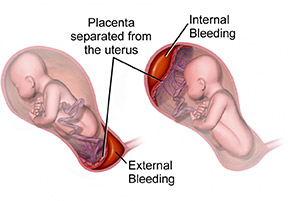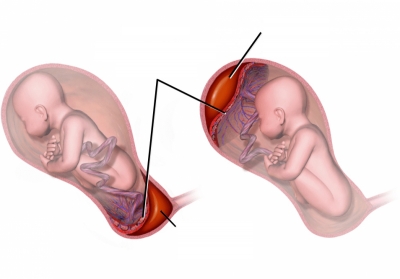What is Abruptio Placenta?
Normally placed Placenta gets separated after childbirth in the third stage of labor, but in Abruptio placenta the placenta may begin to separate from the wall of the uterus much before labor and the blood begins to get collected in between the placenta and the wall of the uterus. In such cases, the women may notice vaginal bleeding. Sometimes the bleeding may be concealed and women may only experience pain. She may experience sudden excruciating abdominal pain, restlessness and may not feel movements of the baby. When examined by a doctor she may have a tender uterus, more distended uterus due to the accumulation of blood, and the fetal heart sound may not be heard. The fetus can get compromised as it may not get the nutrition and oxygen from the separated placenta. Placental abruption occurs most commonly around 25 weeks of pregnancy
So antepartum sudden hemorrhage, anytime after 28 weeks of gestation needs to be examined.
- A Painless bleeding which stops on its own, with uterus relaxed and presenting part high up and fetal heart sound present goes more in favor of Placenta previa.
But, the onset of excruciating pain, painful contractions along with bleeding goes more in favor of abruption. The uterine tone is increased, the fetus may be in distress, and fetal parts may not be clearly felt, and fetal heart sounds may also not be very clear. Rupture of membranes with bloodstained leaking is in favor of abruptio placenta.
Risk factors for placental abruption include disease, trauma, history, anatomy, and exposure to substances. The risk of placental abruption increases sixfold after severe maternal trauma.
Why does this happen?
Scientists believe the placenta can get separated prematurely when the blood supply to the placenta decreases. Blood supply to the placenta may decrease
- Due to the stretching of the uterus. The blood vessels of the placenta can get torn,
- Due to the constriction of uterine vessels. The vessels could get constricted for reasons like cocaine or tobacco use in the mother or sometimes it could be that the mother's vessels are constricted from the beginning,
Because of any of the above reason, the placenta may not be able to get adequate blood for it to grow and supply nutrition to the baby. Mild abruption may be due to tearing of small blood vessels of the placenta and cause mild bleeding and mild growth retardation in the baby. While a more serious one may detach the placenta and cause fetal distress.
Treatment - Bed rest, no per vaginal examination to be done in a clinic, but arrangements should be made to shift the patient to a tertiary hospital.
Patient is usually given mild sedation to allay anxiety. If the bleeding does not subside and if the patient is closer to labor the pregnancy is terminated by active management. Steroids are given to assist in lung maturity of the baby and labor is induced in 48 hours.
In the case of Priya, the bleeding subsided in two days by bed rest and she proceeded to have a healthy baby at term. So through this blog, I want to stress on one point, please be very attentive to any abnormal signs or symptoms during pregnancy. Bleeding in the second trimester is which is painless is usually due to Placenta previa, but if bleeding is associated with pain, please seek the advice of your doctor immediately.
[quix id='8' name='About our Pregnancy Blogs and Videos']






